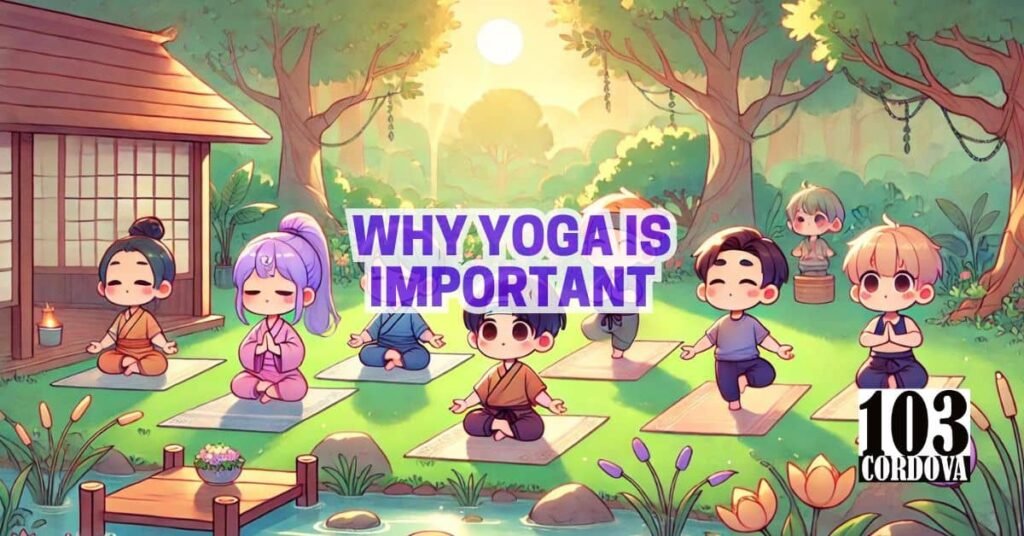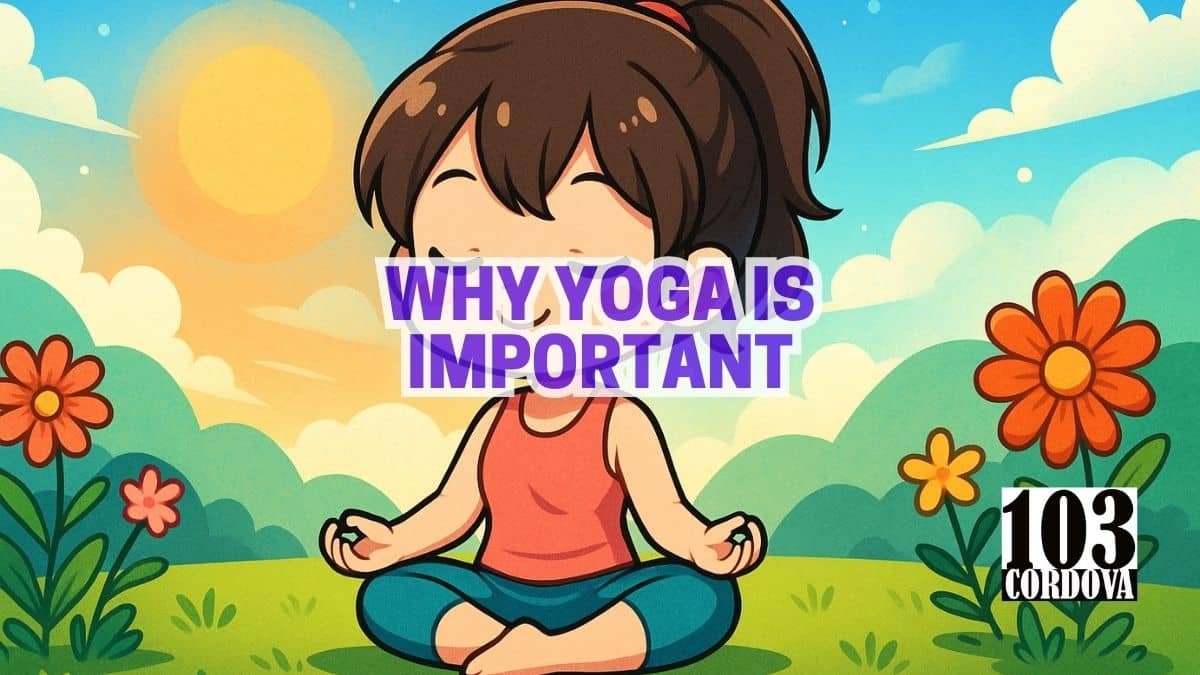Many people today feel overwhelmed by stress, anxiety, and busy lives.
Yoga is a helpful way to care for both your body and your mind.
It uses movement, breathing, and focus to help you feel calmer and in control.
We’ll explain why yoga is important for mental health and how it can reduce stress in everyday life.
With regular practice, yoga can lead to clearer thinking, better sleep, and a more peaceful mood.
1. How Yoga Reduces Stress Hormones and Promotes Relaxation
Yoga is effective in lowering stress hormone levels, particularly cortisol, which is responsible for feelings of stress and anxiety.
When practiced consistently, yoga encourages the body to maintain a calm state even during stressful moments.
Specific yoga postures, such as child’s pose or savasana, combined with deep breathing, ease physical tension and relax tight muscles.
These postures are especially beneficial for those with arthritis, as they gently stretch the body without adding strain, helping to soothe both pain and stress.
Hatha yoga, known for its slower and more deliberate movements, is particularly useful in promoting relaxation by focusing on breathing and controlled poses.
The calming nature of these practices helps regulate the nervous system, reducing the heart rate and creating a feeling of overall tranquility.
Over time, regular practice reduces stress levels and encourages a more balanced, peaceful state of mind.
🧘 The Benefits of Balanced Hot Yoga for Stress Relief
2. How Yoga Changes the Brain to Support Mental Health
Yoga helps the brain grow stronger in areas that control memory and emotions, like the hippocampus.
It also helps the front part of the brain, called the prefrontal cortex, which is used for making good decisions and staying focused.
People who do yoga often may have less activity in the amygdala, the part of the brain that causes fear and stress.
These brain changes make it easier to stay calm, think clearly, and feel better over time.
Scientists have found that practicing yoga regularly can help the brain work in healthier ways, supporting long-term mental wellness.
🧘 A Guide to Choosing the Best Ashtanga Yoga Mats for Stability and Comfort
3. Boosting Mood and Emotional Well-Being Through Regular Yoga Practice
Regular yoga practice offers many health benefits, especially for your mood and emotions.
When you move your body and breathe deeply, your brain releases endorphins, which are chemicals that help you feel happier and more relaxed.
A skilled yoga teacher can guide you through poses and breathing exercises that calm your mind and reduce feelings like anger, stress, or sadness.
In time, yoga may help you become more aware of your emotions and how your body reacts to them.
This awareness makes it easier to handle tough situations without feeling overwhelmed.
People who practice yoga regularly often say they feel more peaceful, less moody, and better able to manage daily challenges.
Because of these benefits, yoga is a helpful and simple way to support mental wellness and emotional balance.
🧘 Understanding the Ashtanga Yoga Closing Sequence and Its Importance
4. Enhancing Body Awareness and Mindfulness with Yoga
Yoga enhances body awareness by encouraging practitioners to pay attention to how their bodies feel during poses.
This mindfulness extends beyond physical movement, fostering a deeper understanding of how mental states influence physical sensations.
By practicing mindfulness, individuals become more attuned to their thoughts and emotions, which allows for better stress management.
Improved body awareness can also help identify areas of tension, leading to more effective ways of releasing it.
Through this connection between mind and body, yoga promotes a more mindful and present way of living.
🧘 The Role of the Ashtanga Yoga Opening Mantra in Preparing Your Mind and Body

5. Improving Sleep Quality and Reducing Back Pain with Yoga
Yoga is known to improve sleep quality by relaxing both the body and the mind before bedtime.
Specific poses, such as the child’s pose and reclining bound angle pose, help release tension in the lower back, hips, and shoulders, making it easier to rest comfortably.
Regular yoga practice also helps regulate the sleep cycle by calming the nervous system and reducing stress levels.
Those who struggle with back pain may find that gentle stretching and strengthening exercises relieve discomfort and contribute to a better night’s sleep.
When sleep improves, mental health naturally benefits as well, promoting a more positive outlook during waking hours.
🧘 Why Advanced Kundalini Yoga Poses Demand Mindfulness and Proper Preparation
6. Building Resilience to Stress with Effective Yoga Asanas
Certain yoga poses, known as asanas, are particularly effective in building resilience to stress.
Poses like the warrior series, tree pose, and downward dog engage the body in a way that requires focus and mental strength, promoting a sense of inner calm.
Regular practice of these poses helps condition the body to handle both physical and mental tension, making it easier to cope with daily stressors.
The physical discipline required in yoga translates to mental discipline, fostering a more balanced response to stressful situations.
This resilience leads to a stronger ability to remain composed in the face of challenges.
🧘 Transforming Your Practice with Ashtanga Yoga Online Classes
7. Alleviating Anxiety and Depression Symptoms: Yoga Can Help
Yoga has been shown to help alleviate symptoms of anxiety and depression by regulating the nervous system and encouraging deep, calming breathing.
The combination of movement and breathwork creates a sense of calm that can ease feelings of worry and hopelessness.
Many yoga practices incorporate meditation and mindfulness, which further support mental clarity and emotional balance.
For individuals dealing with anxiety or depression, yoga offers a non-invasive, holistic way to improve mood and reduce the intensity of negative emotions.
Regular practice can help manage symptoms and contribute to long-term mental health improvement.
🧘 How Ashtanga Yoga Posters Can Motivate Your Daily Practice
8. Increasing Concentration and Focus Through Yoga Benefits
Yoga enhances concentration and focus by training the mind to remain present during each pose and breath.
Poses that require balance and precision, such as tree pose or eagle pose, encourage deep mental focus and help block out distractions.
As the body strengthens, so does the mind, making it easier to maintain attention in everyday tasks.
This improvement in concentration is especially beneficial for individuals who struggle with focus in stressful or demanding situations.
The mental clarity gained through yoga practice can lead to better decision-making and productivity in daily life.
🧘 Enhancing Focus and Concentration Through Ashtanga Yoga Mantras
9. Emotional Regulation and Yoga: Managing Stress and Body Image
Yoga plays a significant role in helping individuals regulate their emotions and manage stress more effectively.
By encouraging self-acceptance and mindfulness, yoga helps practitioners develop a healthier relationship with their body image.
Regular practice provides a safe space for self-reflection, allowing individuals to process emotions without judgment.
This emotional regulation, combined with the stress-relieving benefits of yoga, leads to a more positive outlook on life and improved self-esteem.
As body awareness grows, so does emotional resilience, resulting in a more balanced mental state.
🧘 Why XL Yoga Mats Are Essential for Taller Yogis Seeking Comfort and Alignment
10. Promoting Relaxation and Reducing Stress with Yoga Breathwork
Breathwork, or pranayama, is a key component of yoga that helps promote relaxation and reduce stress.
Deep, controlled breathing signals the brain to relax, lowering heart rate and calming the nervous system.
Techniques such as alternate nostril breathing and diaphragmatic breathing are especially effective in reducing anxiety and encouraging a sense of peace.
Practicing breathwork regularly enhances your ability to stay calm during stressful moments.
This focus on breathing not only soothes the body but also fosters a clearer, more tranquil mind.
🧘 Comprehend the Basics of Yoga Practice
11. Achieving Mental Clarity and Balance Through Different Types of Yoga
Different types of yoga offer various ways to achieve mental clarity and balance.
Restorative yoga, with its slow and calming movements, helps quiet the mind and reduce mental clutter.
On the other hand, more vigorous styles like vinyasa and power yoga challenge the body while sharpening mental focus.
Whether through calm reflection or energetic movement, each style contributes to mental clarity in its own way.
By exploring different types of yoga, practitioners can find the approach that best supports their mental health needs.
💡 Conclusion
Yoga is a transformative practice that provides countless benefits for mental health and stress relief.
Through regular practice, yoga reduces stress hormones, boosts mood, and fosters emotional balance.
It strengthens resilience to life’s challenges while improving focus, sleep quality, and self-acceptance.
With a variety of styles and techniques to choose from, yoga offers a personalized approach to mental well-being.
Incorporating yoga into your routine can lead to lasting positive changes in both mental and emotional health.
🧘 Our Services
Join our yoga classes for all ages at 103 Cordova Tower, Marquinton Residences, Cirma Street, Sto. Nino, Marikina City.
Whether you’re a beginner or experienced, our classes are designed to help you find balance, relaxation, and strength.
Contact us at 09176225780, via Facebook, or through our website’s contact form for more information.
We offer a welcoming environment for all levels, focusing on both mental and physical well-being.
Start your journey to a healthier you with our inclusive yoga classes today!

